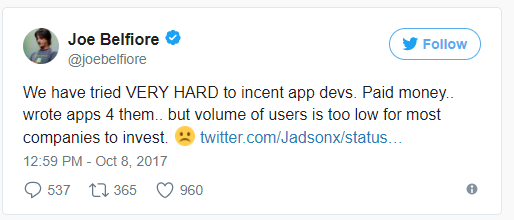
Artificial Intelligence is all the rage… and from a business perspective, it seems that consumer goods are innovating and reaching users faster than enterprise counterparts. Between home assistants, ear buds with live translations, and advanced facial recognition – consumers have plenty of advances, but only 20% of large business have dabbled in AI/process automation.
With the announcement that Windows Mobile is dead, Microsoft seems to be running away from the consumer market. Last week, I said Microsoft is becoming the new IBM, but how do they prevent following in IBM’s fate?
Equifax might still be having security issues while Accenture recently experienced a significant data breach (which was completely self-inflicted).
Acquisitions
- DXC Technology To Acquire Logicalis SMC To Boost Global ServiceNow Practice
Logicalis SMC, a service management consultancy specialist that was the first European company to become a ServiceNow Master Solutions partner, will join DXC’s ServiceNow practice within Fruition Partners, a DXC Technology company and a leading global ServiceNow platform.
- SoftBank Leads $164 Million Bet on Digital-Mapping Startup Mapbox
The Japanese investor, which has stakes in many ride-hailing services, is leading a $164 million investment in Mapbox Inc., a startup that provides mapping and location-search technology to a variety of companies including Snap Inc. and General Electric Co.
The money comes from SoftBank’s nearly $100 billion tech-focused Vision Fund as well as several venture-capital firms including Foundry Group, DFJ Growth, DBL Partners and Thrive Capital. Mapbox said it would expand its efforts into autonomous cars and augmented and virtual reality and will accelerate international expansion, including in China.
https://www.wsj.com/articles/softbank-leads-164-million-bet-on-digital-mapping-startup-mapbox-1507640404
SoftBank is investing in Uber, their Asian competitors, telecoms like Sprint and TMobile, and now they are investing in a mapping company that will feed those other companies a needed service.
Artificial Intelligence/Robotics
- Google’s Pixel Buds translation will change the world
https://www.engadget.com/2017/10/04/google-pixel-buds-translation-change-the-world/
- Adidas will finally start selling shoes made by its robot factory
The robot factory Adidas built in Germany is now fully functional and ready to start making the first Speedfactory shoe that will be sold to the public. Adidas has revealed that it plans to use its Speedfactory’s robots to manufacture a series of Adidas Made For (AM4) kicks designed specifically for six of the world’s biggest metropolises.
The AM4 models are all lightweight and designed using athlete data to conjure up the most comfortable shape and form. If you want to see what Speedfactory’s robot workers are capable of, check out Futurecraft M.F.G. — it’s the very first model out of the facility, though it was never released to the general public.
https://www.engadget.com/2017/10/05/adidas-speedfactory-made-for-shoes/
Cloud
- Microsoft and AWS could be the strangest cloud bedfellows yet
Microsoft and AWS announced they were working on a project together.
Project Gluon is an open source, deep learning project for building, deploying and managing machine learning models. It’s worth noting that AWS and Microsoft compete fiercely in the cloud market. In fact, they each have artificial intelligence toolkits that they are trying to sell customers, yet in this instance they saw it in their mutual best interest to work together instead of competing.
Gluon is one of the big steps ahead in taking out some of the grunt work in developing AI systems by bringing together training algorithms and neural network models, two of the key components in a deep learning system.
- Dell outlines IoT strategy, plans to spend $1 billion on R&D over three years
Dell Technologies launched a new Internet of things division to integrate products and services across the company, new tools to speed up implementations and plans to invest $1 billion in research and development over the next three years.
The new division within Dell Technologies will be run by VMware CTO Ray O’Farrell. His first mission will be to develop IoT products and services throughout the company and develop new technologies.
Datacenter
- Microsoft just purchased all of GE’s newest Irish wind farm capacity for the next 15 years
This is a big deal on several levels. First of all, it means Microsoft will be using a clean energy source to power at least some of its cloud data centers in Ireland. That will likely result in a lower energy bill for Microsoft, while reducing the pollution related to running cloud services.
But this could have an impact beyond the data centers as Microsoft and GE are working on a battery technology that captures excess energy from each wind turbine. If there is excess capacity captured by this method, Microsoft and GE could give it back to the Irish energy grid.
Software/SaaS
- Oracle’s Entrance: Database Giant Unveils Enterprise Blockchain Strategy
The company wants to attract both large and small firms, but Frank Xiong, Oracle’s group vice president of Blockchain Cloud Service, argued that startups looking to test a smart contract or an application will be able to do so more cheaply using the cloud platform because pricing is based on transaction volume.
“This will give them a very good reasonably priced way to start up their application,” he told CoinDesk. “I personally think this will be a big attraction to these startups.”
For existing ERP customers, the platform will provide a way to connect with outside partners and customers, plugging them into internal channels and processes in a confidential and secure manner.
https://www.coindesk.com/oracles-entrance-database-giant-unveils-enterprise-blockchain-strategy/
- Regulate Facebook Like AIM
Sixteen years ago, the FCC, the regulatory body responsible for things like television and radio, approved a merger between American Online and Time Warner, but with several conditions. As part of the deal, AOL was required to make its web portal compatible with other chat apps.
The government stopped AOL from building a closed system where everyone had to use AIM, meaning it had to adopt interoperability—the ability to be compatible with other computer systems.
The FCC required AOL to be compatible with at least one instant messaging rival immediately after the merger went through. Within six months, the FCC required AOL to make its portal compatible with at least two other rivals, or face penalties.
Security
- Accenture left a huge trove of highly sensitive data on exposed servers
The servers, hosted on Amazon’s S3 storage service, contained hundreds of gigabytes of data for the company’s enterprise cloud offering, which the company claims provides support to the majority of the Fortune 100.
The data could be downloaded without a password by anyone who knew the servers’ web addresses.
Chris Vickery, director of cyber risk research at security firm UpGuard, found the data and privately told Accenture of the exposure in mid-September. The four servers were quietly secured the next day.
Also:
Vickery said he also found Accenture’s master keys for its Amazon Web Service’s Key Management System (KMS), which if stolen could allow an attacker full control over the company’s encrypted data stored on Amazon’s servers.
http://www.zdnet.com/article/accenture-left-a-huge-trove-of-client-passwords-on-exposed-servers/

- Russia Has Turned Kaspersky Software Into Tool for Spying
The Wall Street Journal reported last week that Russian hackers used Kaspersky’s software in 2015 to target a contractor working for the National Security Agency, who had removed classified materials from his workplace and put them on his home computer, which was running the program. The hackers stole highly classified information on how the NSA conducts espionage and protects against incursions by other countries, said people familiar with the matter. An NSA spokesman didn’t comment on the security breach.
Kaspersky Lab, founded by an engineer trained at a KGB technical school, has long insisted that it doesn’t assist the Russian government with spying on other countries. But many U.S. officials now think the evidence the U.S. has collected shows the company is a witting partner, said people familiar with the matter.
“There is no way, based on what the software was doing, that Kaspersky couldn’t have known about this,” said a former U.S. official with knowledge of information gleaned in 2015 about how the software was used to search for American secrets. He said the nature of the software is such that it would have had to be programmed to look for specific keywords, and Kaspersky’s employees likely would have known that was happening, this former official said.
https://www.wsj.com/articles/russian-hackers-scanned-networks-world-wide-for-secret-u-s-data-1507743874
Also: Israeli intelligence discovered that Kaspersky was working with the Russian government. See SourceCast Episode 90 to learn more. - Equifax may have been hacked again
Unfortunately, the company still seems to be lacking when it comes to security, because according to Ars Technica, it’s been hacked yet again. Independent security analyst Randy Abrams told Ars that he was redirected to hxxp:centerbluray.info and was met with a Flash download when he went to equifax.com to contest a false info on his credit report.
The fake Flash installer apparently tricks people into downloading what Symantec identifies as Adware.Eorezo, an adware that inundates Internet Explorer with advertisements. Unfortunately, we can’t replicate the problem, but Abrams said he encountered the issue on three separate visits.
Other
- Google parent Alphabet looks to restore cell service in Puerto Rico with Project Loon balloons
Loon was developed by X, part of Alphabet’s innovation group. It was able to help Peru earlier this year, amidst significant flooding and hopes to replicate this success. Yet before it proceeds with its plans in Puerto Rico, Loon needs to find a carrier network to partner with. Loon had already been working with Telefonica in Peru, which sped up the process.
The Loon project consists of a network of high altitude balloons that rise like weather balloons to a height above 60,000 feet. Loon balloons are designed to “ride the wind” to get to a destination and are super-pressurized to withstand for over 100 days in the stratosphere.
Signals are transmitted directly to LTE-enabled devices and are routed through a local carrier, and the balloons are raised and lowered to an altitude with winds blowing in the desired direction.
- Amazon is on the brink of deciding if it will make a big move into selling drugs online
The company will decide before Thanksgiving whether to move into selling prescription drugs online, according to an email from Amazon viewed by CNBC and a source familiar with the situation. If it decides to make that move, it will start expanding its senior team with drug supply chain experts.
Amazon typically spends years researching opportunities before it telegraphs its intentions. The opportunity to sell drugs online is alluring given its market size — analysts have estimated the U.S. prescription drug market at $560 billion per year. Amazon is well aware of the complexities, say sources familiar with the company’s thinking.
- IBM Should Cut Down On Outsourcing To India
Outsourcing provides certain competitive advantages to early-movers – that is, to companies that adopt it first — but it isn’t proprietary. Others can adopt it, and therefore, isn’t a source of sustainable competitive advantage.
Then there’s corporate complacency whereby leadership of these companies fails to renew the pioneering drive that characterizes market leaders.
That’s what eventually happened in the PC industry, to companies like the old HP.
- This is not a drill: Microsoft admits Windows Phone is dead for real
It’s time to say goodbye for real this time. Windows Phone’s death has been slow and painful, but, as CNET spotted, the head of Microsoft’s Windows division finally admitted you shouldn’t expect anything more when it comes to Windows Phone.
Microsoft doesn’t plan to let existing Windows Phone users down — there will be security updates. But don’t expect anything new. Joe Belfiore admitted that Microsoft isn’t working on any software or hardware update.
- Oracle names IBM as strategic HR BPO provider
Without specifically mentioning it IBM also brings several additional technical benefits to the table. The first is IBM Kenexa a competitor to Oracle’s Taleo it delivers more than just applicant tracking. Possibly of greater interest though is the cognitive computing stack that IBM offers in Watson. While Oracle has just launched its augmented intelligence and machine learning capabilities IBM already has some point solutions such as IBM Watson Talent. It will be interesting to see which customers use IBM’s BPO services with Oracle HCM Cloud.
https://www.enterprisetimes.co.uk/2017/10/11/oracle-names-ibm-as-strategic-hr-bpo-provider/

This is really odd. Oracle has never had much of a consulting presence to speak of, but the IBM selection who has been culling their global services business and focusing on automation is very odd.
Photo: Andy Kelly











